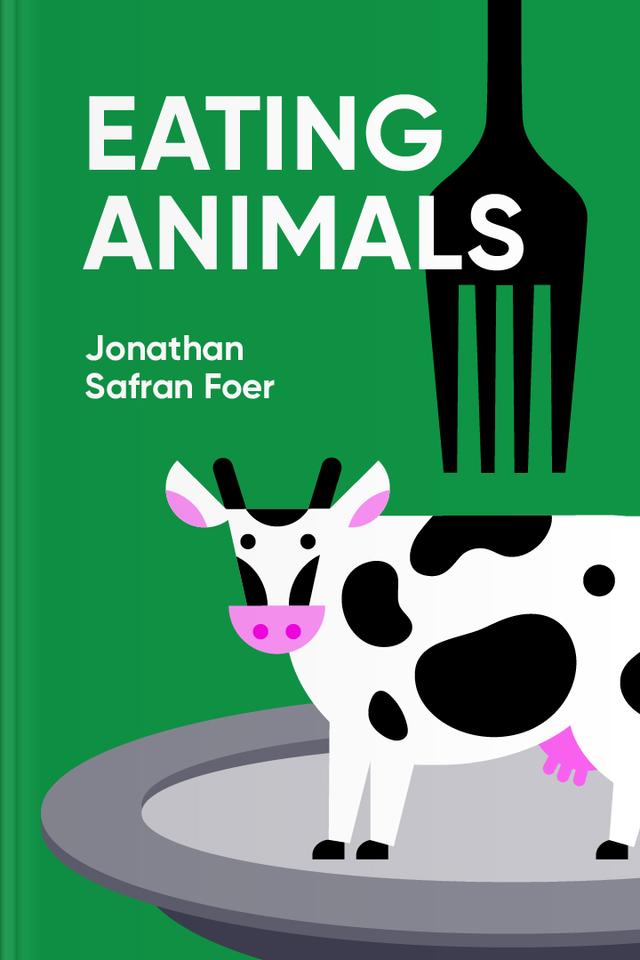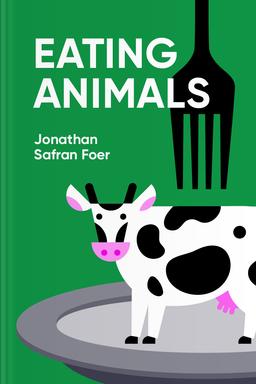You’ll learn
- Reasons to consider vegetarianism
- Whether diet shapes societal norms
- The truth about farming
- What roles pets play in ethics
Protect the world’s peace. Donate to support Ukraine

first KEY POINT
The author's relationship with food was established by his family members, especially by his grandmother. She used to cook only one meal—chicken with carrots, but as kids, Jonathan and his brother Frank thought she was the greatest chef in the world. She survived World War II, and her attitude toward food was nothing like in the modern world. For Foer's grandmother, unhealthy products didn't exist. She thought the fatter the children, the healthier they were and even insisted that they drank Coca-Cola. Food was about dread, religion, and love for her.
There was a time when the Foer brothers were having dinner with their vegetarian babysitter. They asked why she didn't eat the chicken served that day. She replied that she didn't want to hurt any living being. That's when the author realized that a chicken could feel pain like a human. He became a vegetarian for a few years, but slowly this mindset faded away. He ended up pretending that he was a vegetarian at school while consuming meat at home. He continued eating meat in college, and the reason was that it tasted great to him.When Foer met his future wife, they had one core common point—they were both caught in a loop of being vegetarians but ending up eating meat. After getting married, they made a promise to be vegetarians and, again, they couldn't do it. But when Foer's son was born, he realized that he had a chance to make a difference, at least for this little person. When we grow up, our parents teach us the rules of eating food. For example, we don't eat soup for breakfast (what a ridiculous rule), and we can eat chicken but definitely not parrots (tell this to hawks). And these rules influence our personalities a lot.Reading Eating Animals will help you understand more about your eating habits and food culture in your family. You are going to plunge into the world where animals live. The journey will be disillusioning since some facts reveal the shameful behavior of people growing animals for food. You will more likely have an urge to become a vegetarian and help animals in other ways, which is good because they need human support now more than ever.
second KEY POINT
What about our attitudes towards animals? It is also transmitted from our parents to us and then to our kids, and so on. Foer's grandmother and mother feared dogs, and the author took a leaf from them. He freaked out every time a dog would run in the park or even into his friends' houses. Naturally, he didn't even consider himself as a person who would one day adopt a dog. But then he saw George, his future beloved puppy who was sleeping on Seventh Avenue. At first, he couldn't even feed her from the palm. Later, Foer even let the dog lick his face. From then on, he was a typical dog lover who would go crazy when seeing a wagging tail.Those who own a pet might have noticed that their pets have more than basic needs and instincts, like safety and food. Animals have personalities, which makes them even closer to people. Foer realized that George had her own perspective of the world and even human-like emotions. And considering his philosophical and practical intentions to embrace vegetarianism, the author clearly understood that he wouldn't eat his or any other dog. But why would he consume other animals' meat? And why didn't people in some countries like China and South Korea feel guilty about eating dogs for medical purposes?

Continue reading with Headway app
Continue readingfirst KEY POINT
second KEY POINT
third KEY POINT
fourth KEY POINT
fifth KEY POINT